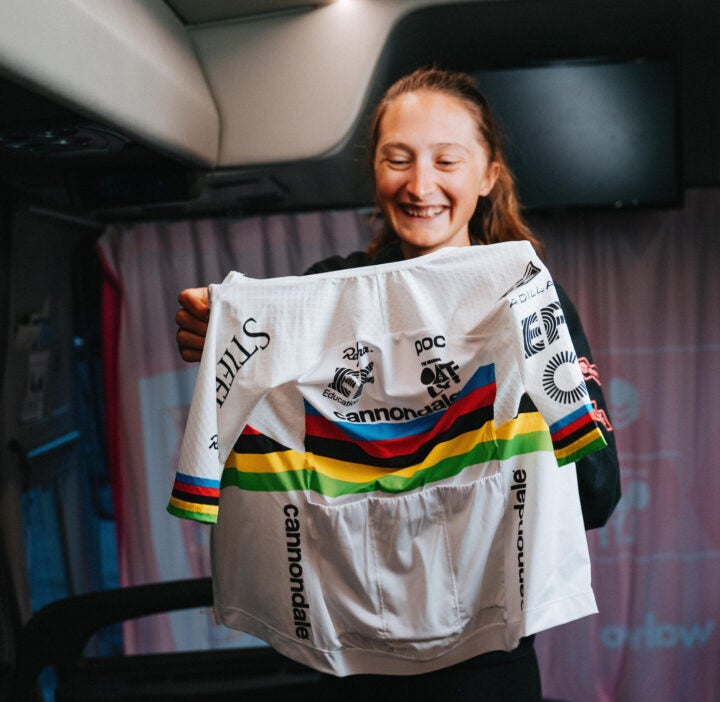Magdeleine Vallieres Funded Her Own Worlds Title Trip and That's Not as Uncommon as You Might Think

Vallieres checks out her new Cannondale frame. (Photo: Gruber Images/Special to Velo)
Magdeleine Vallieres made history in Rwanda as the first Canadian ever to win the UCI road world championships, but her journey to the rainbow jersey came at her own expense.
As Canadian Cycling Magazine reported, the 23-year-old paid for her flight from Spain to Rwanda and covered other fees to race for the national team.
“With government funding flat and the Canadian dollar weak, we’re doing the best we can with what we have,” Scott Kelly, Cycling Canada’s chief sport officer said.
This pay-to-race scenario is more common than might be believed in international competition, as many cycling federations, including Team USA, are facing budget cuts and rising costs across the board.
Unlike some major European teams that receive funding from national lotteries or government budgets, several cycling federations must cobble together a mix of private and public funding sources to cover budgets.
Also read: How the North Americans fared in Rwanda
And sometimes that means riders must pay to race at the international level.
Cycling Canada, for example, works on a tiered system, with top-level confirmed performers seeing flights, accommodations, and other costs fully covered.
Emerging talent and other riders will often be asked to kick in to cover some of their travel costs, meals, and hotel rooms, along with other fees that include staffing, such as mechanics, soigneurs, and coaching.
“Podium athletes do not pay a project fee and have their flight covered. Core and Affiliate athletes pay a project fee and cover their own flight,” Kelly told Canadian Cycling Magazine. “It’s not perfect, but it’s a fairer way of managing costs and keeping opportunities open.”
For Vallieres, it was money well spent.
She made history as Canada’s first world road cycling champion, and debuted her rainbow stripes over the weekend at Giro dell’Emilia, where she raced to seventh for her trade team EF Education-Oatly.
“I am still feeling on a cloud,” she said. “It still feels a bit unreal, but I am really happy, and I think I am going to be happy for a long time. I’m really glad that all of the girls are going to be here to share that moment on the start line with me. I think that is when it is finally going to sink in. It still feels a little bit like I might wake up from this dream.”
Vallieres isn’t the only one

Rwanda road worlds were one of the most exotic in cycling history, and one of the most expensive.
Despite UCI data showing that participation was at near-record levels, many of those numbers came from African athletes in nearby nations, a boon for African cycling for sure.
But many traditional cycling nations brought fewer riders. The reason? Travel costs that included round-trip tickets of $1500 per athlete or more.
High freight costs, long-haul travel, complicated vaccine schedules, and other expenses saw reduced numbers among some federations.
Several nations brought leaner operations to Kigali, with stalwarts like Denmark, Australia, and Spain among nations bringing fewer riders, especially at the lower ranks.
Cycling Ireland sent only an elite men’s team to the world championships, with its junior, U23, and elite women’s teams instead focusing on the European championships over the weekend.
And the Rwanda odyssey only exacerbated financial hurdles for some cash-strapped nations.
Team USA, which was already forced to reduce funding for travel over the past several years, is like some cycling federations that require some riders to pay their own way and/or cover some of the operational costs of racing in the worlds.
USA Cycling — which receives no federal funding for its annual budget — has a tiered system similar to Canada’s, where some riders are funded and others have to help cover costs.
This summer, 2019 junior world champion Megan Jastrab started a GoFundMe page to help U.S. junior cyclists cover some of their own travel and operational costs that can run up to $4,000 per athlete.
For 2026, with the worlds in Canada, both Team USA and Cycling Canada will go all-in on a rare North American worlds. And travel costs will be a lot less and representation will be a lot deeper.